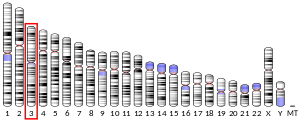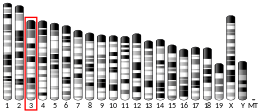CLRN1
Clarin-1 is a protein that in humans is encoded by the CLRN1 gene.[5][6][7]
| CLRN1 | |||||||||||||||||||||||||
|---|---|---|---|---|---|---|---|---|---|---|---|---|---|---|---|---|---|---|---|---|---|---|---|---|---|
| Identifiers | |||||||||||||||||||||||||
| Aliases | CLRN1, RP61, USH3, USH3A, clarin 1 | ||||||||||||||||||||||||
| External IDs | OMIM: 606397 MGI: 2388124 HomoloGene: 17738 GeneCards: CLRN1 | ||||||||||||||||||||||||
| |||||||||||||||||||||||||
| |||||||||||||||||||||||||
| Orthologs | |||||||||||||||||||||||||
| Species | Human | Mouse | |||||||||||||||||||||||
| Entrez | |||||||||||||||||||||||||
| Ensembl | |||||||||||||||||||||||||
| UniProt | |||||||||||||||||||||||||
| RefSeq (mRNA) | |||||||||||||||||||||||||
| RefSeq (protein) | |||||||||||||||||||||||||
| Location (UCSC) | Chr 3: 150.93 – 150.97 Mb | Chr 3: 58.84 – 58.89 Mb | |||||||||||||||||||||||
| PubMed search | [3] | [4] | |||||||||||||||||||||||
| Wikidata | |||||||||||||||||||||||||
| |||||||||||||||||||||||||
Function
This gene encodes a protein that contains a cytosolic N-terminus, multiple helical transmembrane domains, and an endoplasmic reticulum membrane retention signal, TKGH, in the C-terminus. The encoded protein may be important in development and homeostasis of the inner ear and retina. Mutations within this gene have been associated with Usher syndrome type IIIa. Multiple transcript variants encoding distinct isoforms have been identified for this gene.[7]
gollark: I... do not think so.
gollark: It would probably be more useful to spend time learning linear algebra and such.
gollark: I do not actually know quantum mechanics in much detail.
gollark: Polysyllabic designations are extremely practical for perplexing the vocabularistically limited.
gollark: Yes, that seems reasonable.
References
- GRCh38: Ensembl release 89: ENSG00000163646 - Ensembl, May 2017
- GRCm38: Ensembl release 89: ENSMUSG00000043850 - Ensembl, May 2017
- "Human PubMed Reference:". National Center for Biotechnology Information, U.S. National Library of Medicine.
- "Mouse PubMed Reference:". National Center for Biotechnology Information, U.S. National Library of Medicine.
- Sankila EM, Pakarinen L, Kaariainen H, Aittomaki K, Karjalainen S, Sistonen P, de la Chapelle A (May 1995). "Assignment of an Usher syndrome type III (USH3) gene to chromosome 3q". Hum Mol Genet. 4 (1): 93–8. doi:10.1093/hmg/4.1.93. PMID 7711740.
- Joensuu T, Blanco G, Pakarinen L, Sistonen P, Kaariainen H, Brown S, Chapelle A, Sankila EM (Mar 1997). "Refined mapping of the Usher syndrome type III locus on chromosome 3, exclusion of candidate genes, and identification of the putative mouse homologous region". Genomics. 38 (3): 255–63. doi:10.1006/geno.1996.0626. PMID 8975700.
- "Entrez Gene: CLRN1 clarin 1".
Further reading
- Adato A, Kalinski H, Weil D, et al. (1999). "Possible interaction between USH1B and USH3 gene products as implied by apparent digenic deafness inheritance". Am. J. Hum. Genet. 65 (1): 261–5. doi:10.1086/302438. PMC 1378101. PMID 10364543.
- Joensuu T, Hämäläinen R, Lehesjoki AE, et al. (2000). "A sequence-ready map of the Usher syndrome type III critical region on chromosome 3q". Genomics. 63 (3): 409–16. doi:10.1006/geno.1999.6096. PMID 10704288.
- Joensuu T, Hämäläinen R, Yuan B, et al. (2001). "Mutations in a Novel Gene with Transmembrane Domains Underlie Usher Syndrome Type 3". Am. J. Hum. Genet. 69 (4): 673–84. doi:10.1086/323610. PMC 1226054. PMID 11524702.
- Adato A, Vreugde S, Joensuu T, et al. (2003). "USH3A transcripts encode clarin-1, a four-transmembrane-domain protein with a possible role in sensory synapses". Eur. J. Hum. Genet. 10 (6): 339–50. doi:10.1038/sj.ejhg.5200831. PMID 12080385.
- Fields RR, Zhou G, Huang D, et al. (2002). "Usher Syndrome Type III: Revised Genomic Structure of the USH3 Gene and Identification of Novel Mutations". Am. J. Hum. Genet. 71 (3): 607–17. doi:10.1086/342098. PMC 449697. PMID 12145752.
- Strausberg RL, Feingold EA, Grouse LH, et al. (2003). "Generation and initial analysis of more than 15,000 full-length human and mouse cDNA sequences". Proc. Natl. Acad. Sci. U.S.A. 99 (26): 16899–903. doi:10.1073/pnas.242603899. PMC 139241. PMID 12477932.
- Ness SL, Ben-Yosef T, Bar-Lev A, et al. (2003). "Genetic homogeneity and phenotypic variability among Ashkenazi Jews with Usher syndrome type III". J. Med. Genet. 40 (10): 767–72. doi:10.1136/jmg.40.10.767. PMC 1735287. PMID 14569126.
- Gerhard DS, Wagner L, Feingold EA, et al. (2004). "The Status, Quality, and Expansion of the NIH Full-Length cDNA Project: The Mammalian Gene Collection (MGC)". Genome Res. 14 (10B): 2121–7. doi:10.1101/gr.2596504. PMC 528928. PMID 15489334.
- Aller E, Jaijo T, Oltra S, et al. (2005). "Mutation screening of USH3 gene (clarin-1) in Spanish patients with Usher syndrome: low prevalence and phenotypic variability". Clin. Genet. 66 (6): 525–9. doi:10.1111/j.1399-0004.2004.00352.x. PMID 15521980.
- Plantinga RF, Kleemola L, Huygen PL, et al. (2005). "Serial audiometry and speech recognition findings in Finnish Usher syndrome type III patients". Audiol. Neurootol. 10 (2): 79–89. doi:10.1159/000083363. PMID 15650299.
External links
- GeneReviews/NCBI/NIH/UW entry on Retinitis Pigmentosa Overview
- Human CLRN1 genome location and CLRN1 gene details page in the UCSC Genome Browser.
This article is issued from Wikipedia. The text is licensed under Creative Commons - Attribution - Sharealike. Additional terms may apply for the media files.



